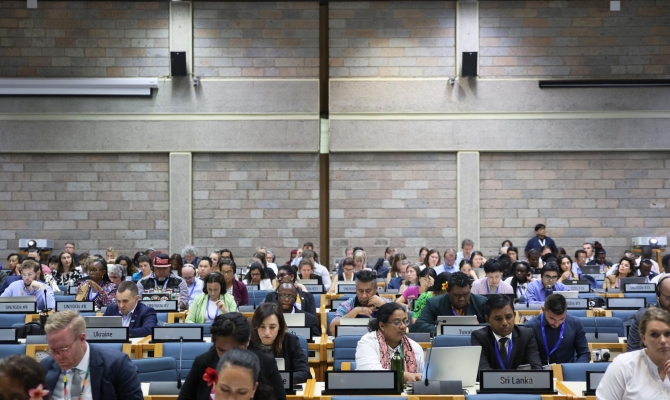
12 April 2024, Apia Samoa - To say waste generation - including plastic pollution is a global problem - would be stating things quite mildly. The statistics are in fact staggering, and even more concerning especially for Pacific countries who despite contributing less than 1.3 per cent to global plastic pollution, are disproportionately affected by the plastic pollution crisis, threatening livelihoods, health and economies.
According to a new UN Environment Programme (UNEP) report titled "Beyond an age of waste: Turning rubbish into a resource," municipal solid waste generation is predicted to grow from 2.3 billion tonnes in 2023 to 3.8 billion tonnes by 2050. The report found that in 2020, the global direct cost of waste management was an estimated USD 252 billion.
However, when factoring in the hidden costs of pollution, poor health and climate change from poor waste disposal practices, the cost rises to USD 361 billion. Without urgent action on waste management, by 2050 this global annual cost could almost double to a staggering USD 640.3 billion. Pacific countries are at the forefront of paying this cost, taking a toll on health, degrading natural ecosystems, food security and impacting social and economic development.
From 23-29 April 2024, delegations from 14 Pacific countries will be in Ottawa, Canada, to advocate for the Pacific’s priorities at the fourth meeting of the Intergovernmental Negotiating Committee (INC) to develop an international legally binding instrument on plastic pollution, including in the marine environment (Plastic Pollution INC-4).
The focus will be on the revised draft text of the future treaty, containing the merged texts from Contact Group 1, Contact Group 2, Contact Group 3 following the discussions of a zero draft text at INC-3 in Nairobi, last year.
The revised draft text consists of six parts. It was the subject of a four-day Pacific Regional Preparatory Workshop in Auckland in February. Vanuatu, as the Chair of the Pacific Small Island Developing States (PSIDS) group welcomed the discussion, saying it had put Pacific countries in a better position to coordinate and strategise as a group.
“We believe that a unified voice will bring more impact during the negotiations in INC-4,” said Ms Majorie Wells, the representative of the PSIDS Chair in Auckland. “I think we have a common understanding of the issues we are up against and our positions in a number of agenda items we have looked at. That said, we do have a lot of work in front of us leading to INC-4. I trust our member states will do our very best to prepare for the negotiations as we work to ensure a Cleaner Pacific.”
Samoa, as the Chair of the 39 member Alliance of Small Island States (AOSIS), was also actively engaged in the discussions, with Ms Anama Solofa, AOSIS Lead Negotiator on Oceans, saying: “It has been very encouraging to see the level of engagement from the Pacific region and the confidence that has grown across the different sessions of the INC. The Pacific SIDS is a very strong group within themselves, and AOSIS is a platform for amplifying the one Pacific voice, which is what we hope to do in areas where there are common positions, between the Pacific SIDS and the wider AOSIS group.”
The INC was formed during the fifth Session of the United Nations Environment Assembly (UNEA), when they agreed to the resolution to “End Plastic Pollution: Towards an International Legally Binding Instrument”.
The first three INCs were held in Uruguay, France and Kenya respectively. The Secretariat of the Pacific Regional Environment Programme (SPREP) continues to work with the Governments of Australia and New Zealand, and key partners, to support Pacific countries and build the capacity of Pacific negotiators to amplify the one Pacific Voice at the INC.
SPREP’s Director of Waste Management and Pollution Control (WMPC), Mr Anthony Talouli, reminded that the ongoing INC negotiations is about the survival of Pacific communities who have been unfairly placed at the forefront of the escalating plastics crisis.
“What our Pacific countries want from the INC negotiations is an ambitious treaty that covers the full lifecycle of plastic pollution that is applicable to all Small Island Developing States,” said Mr Talouli. “As we look to INC-4, the priorities for PSIDS are many however we see the main elements would be in five core measures: primary plastic polymers, chemicals and polymers of concern, problematic and avoidable plastic products, trade, and design. These will be supported by information sharing, non-plastic substitutes, capacity exchange, reporting, transparency, tracking, monitoring and labelling, emissions and releases as well as waste management.”
INC-4 will be preceded by regional preparatory meetings, starting on 17 April 2024. Delegates will have their work cut out, with the goal to progress negotiations toward the final text, which member states have committed to sign by the end of 2024, when INC-5 is scheduled in Korea.
The fourth Intergovernmental Negotiating Committee to develop an international legally binding instrument on plastic pollution, including in the marine environment is taking place in Ottawa, Canada, from 23-29 April 2024.
The Pacific Islands are represented by the Cook Islands, Federated States of Micronesia, Fiji, Kiribati, Marshall Islands, Nauru, Niue, Palau, Papua New Guinea, Samoa, Solomon Islands, Tonga, Tuvalu and Vanuatu through the support of the Government of Australia and the United Nations.
They are supported by the Secretariat of the Pacific Regional Environment Programme (SPREP), working with partners the Pacific Islands Forum Secretariat (PIFS), Office of the Pacific Ocean Commissioner (OPOC), The Pacific Community (SPC), Forum Fisheries Agency (FFA), Environmental Investigation Agency (EIA), Centre for International Environmental Law (CIEL), University of Wollongong, WWF and Massey University.
For more information visit: https://www.unep.org/inc-plastic-pollution/session-4